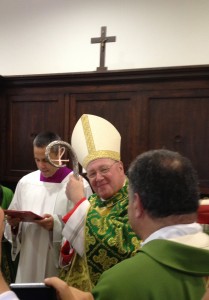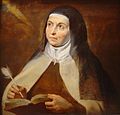Archbishop Kurtz’s Synod Blog
Monday, October 15, 2012
Hardship without humor is hard to take. St. Teresa of Avila, whose feast we celebrate today, had her share of hardships. In the renewal of the Carmelites and as she established the shoeless or discalced Carmelites, St. Teresa endured a great deal.
One humorous story tells of her being thrown from a horse as she crossed a river. Looking up to heaven, it is reported that she said, “If this is how you choose your friends, Oh God, no wonder you have so few!”
One theme of this Synod has been the hardship of religious liberty endured in places like the Middle East, the Far East, and Africa.
As I listen to accounts of the assaults on religious liberty, my heart goes out to those who suffer. I also acknowledge the assaults in the United States, especially the Department of Health and Human Services mandates.
As we seek the courage to stand up for religious freedom as the first freedom, we also seek the example of St. Teresa of Avila, who brought joy and even humor to a world filled with hardships.
In the midst of hardship, we often find stories of lively faith among those who trust God and embrace the gift of joy, a gift that allows us to enjoy the humorous parts of life.
The gift of joy is a great lesson as I begin the second week of the Synod and the responsibility that comes with it. We need, sometimes, to take ourselves less seriously and trust in God’s grace to direct the new evangelization amidst hardship and, yes, the joy and even humor of serving the Lord Jesus.
Here is the prayer from St. Teresa of Avila that I say each morning:
Nada te turbe,
nada te espante;
todo se pasa,
Dios no se muda.
La paciencia todo lo alcanza.
Quien a Dios tiene nada le falta
solo Dios basta.
nada te espante;
todo se pasa,
Dios no se muda.
La paciencia todo lo alcanza.
Quien a Dios tiene nada le falta
solo Dios basta.
Let nothing disturb you,
Let nothing frighten you,
All things are passing away:
God never changes.
Patience obtains all things.
Whoever has God lacks nothing;
God alone suffices.
Let nothing frighten you,
All things are passing away:
God never changes.
Patience obtains all things.
Whoever has God lacks nothing;
God alone suffices.
Sunday, October 14, 2012
“Come, worship the Lord for we are his people, a flock he shepherds, alleluia.” Today’s invitatory antiphon calls all to Christ, the Good Shepherd, the source of all evangelization.
Yesterday, there was a call to “return to the Holy Land” on pilgrimage, and I could not he lp but go back in my mind to the initial proclamation of Jesus as we seek a path for the new evangelization. It is clear that every one of us who follows Christ has an important task in this new proclamation, and only by returning to the source can we ever hope to fulfill this privileged task.
lp but go back in my mind to the initial proclamation of Jesus as we seek a path for the new evangelization. It is clear that every one of us who follows Christ has an important task in this new proclamation, and only by returning to the source can we ever hope to fulfill this privileged task.
 lp but go back in my mind to the initial proclamation of Jesus as we seek a path for the new evangelization. It is clear that every one of us who follows Christ has an important task in this new proclamation, and only by returning to the source can we ever hope to fulfill this privileged task.
lp but go back in my mind to the initial proclamation of Jesus as we seek a path for the new evangelization. It is clear that every one of us who follows Christ has an important task in this new proclamation, and only by returning to the source can we ever hope to fulfill this privileged task.
In this month of the Holy Rosary, I recall the third luminous mystery given to us by Blessed John Paul II: The Proclamation of the Kingdom and the Call to Conversion.
We carry this proclamation of the saving cross and resurrection of Jesus Christ from one generation to the next, always with our hearts touched and converted to Him as we seek the Reign of God that He announced and ushered forth.
Last evening I accompanied Cardinal Dolan to the Mass for priest students at Casa Santa Maria, and this morning, I joined Cardinal Dolan at his titular church of Our Lady of Guadalupe. It was great to see the energy of young priests preparing for the apostolate and join with an active parish in Rome to celebrate the Holy Eucharist and pray for the new evangelization.
It also is a blessing to have a respite from five-minute interventions for a day. Tomorrow, of course, I will be ready for week two!
Saturday, October 13, 2012
It is getting more difficult to choose the best experiences to write about, but I would like to share two from yesterday.
At 1 p.m. after the morning session of the Synod, our Holy Father invited Synod delegates to come together forpranzo (lunch) in honor of the bishops who had participated at the Vatican Council II. This video by Salt and Light of Canada describes very well the preparation for that meal, as well as other features of the Synod:
The Vatican Daily Bulletin will report the wonderful speech of our Holy Father, but what won’t get coverage is the table at which I sat and ate. This table was a microcosm of Church in the modern world and the rich tapestry of the Synod. My table companions included the Mother General of the Missionaries of Charity (now in Calcutta, though a native of Germany and the successor once-removed of Blessed Teresa of Calcutta); the Archbishop of Lesotho in South Africa; the Archbishop from Bolivia (who was of Polish origins) and another from the mountains of Peru; one from Holland (who studied at Catholic University of America); a professor from Santa Croce in Rome; and a Filipino Archbishop whose Archdiocese totals nearly 4 million Catholics. We mainly spoke in English, but there were some Spanish-speakers. I thank my friend Archbishop Gustavo Garcia-Siller of San Antonio for his presence and for the easy way he translated the conversation when I got lost!
At the table, we spoke of everything from Church to culture to Synod happenings. Mostly there was that laughter and joy that marks followers of Jesus Christ! There will be many public propositions coming from the synod deliberations, but these encounters will not make the headlines. Nonetheless, they are important tiles in the mosaic of this Synod on the New Evangelization for the Transmission of the Faith.
Later in the afternoon, Synod delegates attended a presentation on science and faith. Dr. Werner Arber, from the University of Basel in Switzerland and an active member of the Pontifical Academy of Science, made a presentation on recent developments in the science of evolution. Science begins with curiosity, and, done well, this enterprise uncovers the basis of natural law. While evolution answers many questions, it does not answer the “root” questions. These questions, according to Dr. Arber, are in the realm of philosophy. He reminded us that people of faith have a belief in God, but atheists also have a belief in the nonexistence of God. He spoke of the cultural values of science, which enrich our world view and open the world to innovations that shape the future. Essential to the task of addressing these questions in the philosophical realm is the call for a clear assessment of scientific advancements to ensure that the “progress” is truly good and ethical.
Dr. Arber spoke of the role of the church as an evangelizer of culture. In this role, religion and science are not enemies. While some picture religion and science as walking on the same road, but in different directions, the task of evangelization is for religion and science to walk hand-in-hand.
Thus, my horizons on the new evangelization and its far-reaching aspects continue to emerge, and I am coming to see the great dimensions of evangelizing culture that are part of the Synod. I had the encouragement of Frs. Tom Boland and Pat Dolan back home to be attentive to science and its relationship to faith and the new evangelization, and here it is before me now.
All of these discussions remind me that our faith is deeply personal, but it also is public. Jesus calls the baptized to renew the face of the earth, and we do so by proposing, not imposing, our values and convictions.
Today is a full day of Synod sessions that includes Mass and an evening meal at the Casa, the house for doctoral student priests from America and the original home of the North American College.
Thank you for your continued prayers and good wishes.
Friday, October 12, 2012
This video from Rome Reports is titled, “Synod: Vice President of the American Bishops suggests a blessing for children in the womb.”

No comments:
Post a Comment